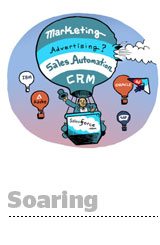 Here’s today’s AdExchanger.com news round-up… Want it by email? Sign-up here.
Here’s today’s AdExchanger.com news round-up… Want it by email? Sign-up here.
Level Up
Wondering what Salesforce is up to with Krux? Wonder no more. The company unveiled three capabilities powered by the data management platform. First is a tool that helps advertisers deliver the “ideal ad frequency.” Second is the ability to use data from any Salesforce cloud to determine the proper messaging – so a TV manufacturer, for instance, won’t advertise to a consumer who’s got a service issue with their TV. Third, Salesforce is uncorking a dashboard powered by its AI initiative, Einstein, designed to tell marketers which sequence of messages led to the desired consumer action. Read more.
Nielsen Vs. NBCU
Nielsen is on track to release the commercial version of its Total Content Ratings, a system for tabulating audiences on TV and streaming channels, despite a leaked email from NBCUniversal sales chief Linda Yaccarino stating that the solution “does much more harm than good” and “in its current form fails to deliver on this objective.” Yaccarino sits atop a veritable carrier fleet of a media portfolio, but unruly broadcast clients are old hat for Nielsen and nothing she wrote precludes its March 1 target. More at Variety.
Travel Search Gambit
Trivago hopes to spin gold out of search and metasearch. The metasearch hotel-booking site, which like Kayak or TripAdvisor collects fees by surfacing room rates from across the web, aims to raise almost $430 million in an upcoming IPO. Trivago has a blistering growth rate – about 60% last year and projected to remain above 30% for years – but of the $657.4 million it’s made this year, $604.7 million went straight back into TV and search ads. Some in the industry (and certainly some competitors) are dubious about Trivago’s growth prospects, reports Bloomberg. Spending 90% of revenue on ads isn’t sustainable, so “it will be interesting to see how they manage their growth trajectory as they pull back on marketing,” said Kayak CEO Steve Hafner at a conference last month. More.
Damaged Goods
Yahoo disclosed another hack that occurred in 2013 and affected more than 1 billion user accounts. That’s double the number of accounts hacked in 2014, which Yahoo revealed in September. The stolen information includes names, numbers, email addresses, telephone numbers, dates of birth and passwords. Verizon and Yahoo were on the cusp of agreeing on a price alteration for potential liabilities related to the first hack when the second surfaced. What’s papa Verizon thinking now? “We will evaluate the situation as Yahoo continues its investigation,” a Verizon spokesperson said. “We will review the impact of this new development before reaching any final conclusions.” More at The Wall Street Journal. But Bloomberg reports, from an unnamed source, that Verizon is gunning for a price cut – or an exit. More.
Privacy Please
Forrester analyzed how consumers feel about advertisers leveraging their personal data. The report breaks out consumers in four segments: data-savvy digitals (36%), reckless rebels (31%), nervous nellies (12%) and skeptical protectionists (22%). Analyst Fatemeh Khatibloo found that consumers don’t view privacy as black and white, but nuanced; they care more about it in certain situations than others. More than half of consumers (67%) are willing to share personal information with companies when there’s a value exchange, but those companies that misuse consumer data severely suffer in brand loyalty. And when it comes to boomers (and beyond), they feel helpless about protecting themselves online. More.
But Wait, There’s More!
You’re Hired!
This post was syndicated from Ad Exchanger.

More Stories
PHD Aotearoa’s new senior leadership team appointments
Burger on the dancefloor: Spark celebrates free data for Spotify music with exclusive event
Around the World: Elon Musk’s brand freefallin’ and celebrity splits shine in marketing